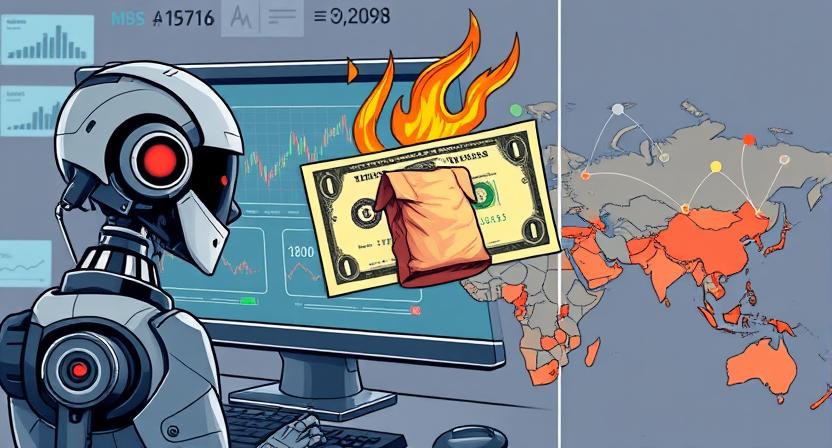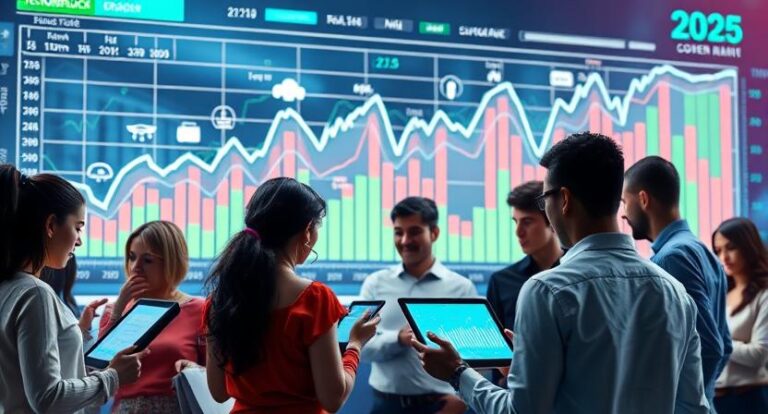The stock market has always been shaped by a mix of economic forces, investor psychology, and global developments. But 2025 is proving to be a particularly unpredictable year. With artificial intelligence (AI) transforming industries, inflation lingering in certain regions, and geopolitical uncertainty on the rise, the markets are moving to a new rhythm. For new and experienced investors alike, the question is: What forces are truly shaping the market landscape this year?
Let’s break it all down in a clear, beginner-friendly way. In this article, we’ll explore how AI innovation, inflationary pressures, and global conflicts are impacting stocks, sectors, and investor behavior.
1. The Rise of Artificial Intelligence: More Than Just a Buzzword
In 2025, AI is not just a hot topic — it’s a major economic driver. From healthcare diagnostics to stock trading algorithms and even fast-food automation, artificial intelligence is becoming deeply embedded in our daily lives.
How AI is Driving Markets:
- Productivity Gains: Companies adopting AI are improving efficiency and cutting costs.
- Investor Excitement: AI-focused stocks (like chipmakers, software firms, and robotics) are drawing attention and funding.
- M&A Activity: Larger tech companies are acquiring smaller AI startups to stay competitive.
Sectors Benefiting from AI in 2025:
- Semiconductors (e.g., NVIDIA, AMD): Essential for training AI models.
- Cloud Infrastructure (e.g., Amazon AWS, Microsoft Azure): Powering AI services.
- Healthcare & Biotech: AI-driven diagnostics, drug development, and robotic surgery.
- Finance & Trading Platforms: Using AI for fraud detection and algorithmic trading.
Investors are bullish on AI, but there’s a word of caution: valuations for some AI stocks are sky-high. So while the sector is promising, due diligence is more important than ever.
2. Inflation: Still Lingering, Still Influential
Inflation was the economic buzzword of 2022 and 2023. While central banks have managed to cool it in many countries, in 2025 it hasn’t disappeared completely.
What’s Happening with Inflation in 2025?
- U.S. & Eurozone: Inflation is hovering around 2.5% to 3%, slightly above targets.
- Emerging Markets: Some regions are experiencing higher inflation due to food and energy prices.
- Interest Rates: Central banks are maintaining relatively high rates to keep inflation in check.
Why It Matters to Investors:
- Interest Rates Affect Stocks: High rates make borrowing costlier, which can hurt business growth.
- Consumer Spending: When everyday goods cost more, consumers may cut back, affecting retail and hospitality sectors.
- Bonds vs. Stocks: Rising interest rates make bonds more attractive, potentially pulling money away from stocks.
Sectors Sensitive to Inflation:
- Utilities & Real Estate: High debt loads make them vulnerable to rising rates.
- Consumer Staples: Companies that produce essential goods often pass costs to consumers.
- Financials: Banks can benefit from higher interest margins.
Inflation remains a key factor in portfolio decision-making. Investors are balancing growth stocks with defensive assets like bonds and dividend-paying stocks.
3. Geopolitical Tensions: A Global Market Wildcard
Political instability and conflict often rattle markets. And 2025 is no different. Ongoing wars, trade disputes, and diplomatic standoffs are injecting unpredictability into global investing.
Flashpoints in 2025:
- Eastern Europe: Prolonged conflict continues to disrupt energy supply chains and global trade.
- Asia-Pacific: Tensions around Taiwan and the South China Sea remain high.
- Middle East: Fluctuations in oil supply due to regional conflicts affect global prices.
How Markets React:
- Energy Stocks Surge: Oil and gas prices spike during instability, boosting related stocks.
- Defense & Aerospace: Companies like Lockheed Martin and Raytheon see rising demand.
- Safe-Haven Assets: Gold, the U.S. dollar, and Treasury bonds often rise during uncertainty.
Impact on Global Trade: Disruptions in shipping lanes, sanctions, and increased tariffs lead to supply chain issues. This can cause stock prices to drop for companies dependent on global suppliers or markets.
Investors are keeping a close eye on foreign policy and military developments, knowing they can dramatically shift market sentiment overnight.
4. Sector Spotlight: Who’s Winning and Losing in 2025?
Winners:
- Technology (AI, cybersecurity, green tech)
- Defense & Aerospace
- Energy (especially clean energy and oil)
- Financials (banks benefiting from higher interest rates)
Struggling Sectors:
- Retail (especially non-essential consumer goods)
- Travel & Leisure (sensitive to global tensions and inflation)
- Real Estate (impacted by high interest rates and urban migration trends)
Understanding which sectors are thriving can help investors rebalance their portfolios for better performance in 2025.
5. The Role of Retail Investors & Sentiment Trends
Retail investors (everyday people buying stocks through apps like Robinhood or Fidelity) continue to influence markets.
Trends in 2025:
- Increased AI Usage: Many investors use AI tools for stock research and portfolio building.
- Social Investing: Communities on Reddit, YouTube, and Discord share insights and influence trends.
- Thematic ETFs: Funds that focus on specific themes (AI, ESG, defense) are gaining popularity.
While retail investors often follow momentum, they can also create it. Viral stocks can surge or crash based on sentiment alone, so staying grounded in fundamentals is critical.
6. Risk Management in a Volatile Year
With so many powerful forces at play, 2025 requires smart risk management.
Tips for Navigating Market Uncertainty:
- Diversify: Don’t put all your eggs in one basket. Spread across sectors and geographies.
- Have a Plan: Know your investing goals, time horizon, and risk tolerance.
- Use Stop-Loss Orders: Especially in volatile sectors.
- Stay Informed: Follow economic reports, central bank updates, and global news.
- Think Long-Term: Short-term noise shouldn’t distract from your long-term wealth-building strategy.
Final Thoughts: Opportunity Amid Complexity
2025 might feel overwhelming, especially for newer investors. AI innovation is exciting but fast-moving. Inflation is stubborn and forces tough economic decisions. Global conflicts make the future unpredictable. But these challenges also create opportunities.
Smart investors are paying attention, staying flexible, and using technology to make better decisions. If you approach investing with curiosity, discipline, and patience, you’ll be in a strong position to navigate whatever comes next.


